Are you ready to become a woodworking wizard and make your next DIY project a success? Having the right tools is key. From the simple hammer to the powerful power saw, woodworking has many essential tools. These tools can greatly improve your work’s quality and efficiency.
This guide will cover the must-have woodworking tools for every DIY enthusiast. It doesn’t matter if you’re an expert or just starting. You’ll learn about tools that can take your projects to the next level. They’ll help you work more precisely and safely in your workshop.
Key Takeaways
- Discover the essential hand tools and power tools that every DIY woodworker needs
- Learn how the right tools can enhance efficiency, precision, safety, versatility, and longevity of your woodworking projects
- Explore the must-have woodworking machinery, from chop saws to jointers, and understand their role in your workshop
- Familiarize yourself with the specialized tools for wood carving, wood turning, and wood finishing
- Understand the importance of proper tool maintenance and safety protocols in your woodworking workshop
Importance of the Right Tools for DIY Projects
Having the right woodworking tools is key for any DIY project’s success. The right tools boost efficiency and save time, letting you finish projects faster and with more precision and accuracy. They also make your workshop safety focused, letting you work without fear of accidents.
Tools that are versatile and adaptable are also crucial. A toolbox full of different tools lets you easily handle many DIY projects, from woodworking to electrical work. Plus, investing in quality tools means they’ll last a long time, saving you money and hassle.
Efficiency and Time-Saving
The right tools make you more efficient and save you time. For instance, a strong cordless drill makes screwing and drilling fast. A circular saw cuts wood quickly and accurately, unlike a handsaw.
Precision and Accuracy
Getting your measurements and cuts right is key for DIY success. Woodworking tools like a framing square or a miter saw help you achieve professional results. They ensure your work is perfectly aligned and sized.
Safety
Keeping your workshop safe is very important when doing DIY. Using the right tools, like safety goggles and gloves, prevents accidents and keeps you safe from injuries.
Versatility and Adaptability
Having a wide range of tools makes it easy to handle different DIY projects. For example, a jigsaw is great for detailed cuts, and a router adds decorative touches to woodworking.
Longevity and Durability
Buying high-quality, durable tools is a smart move. These tools don’t break easily and stay reliable for years, saving you money and trouble in the long run.
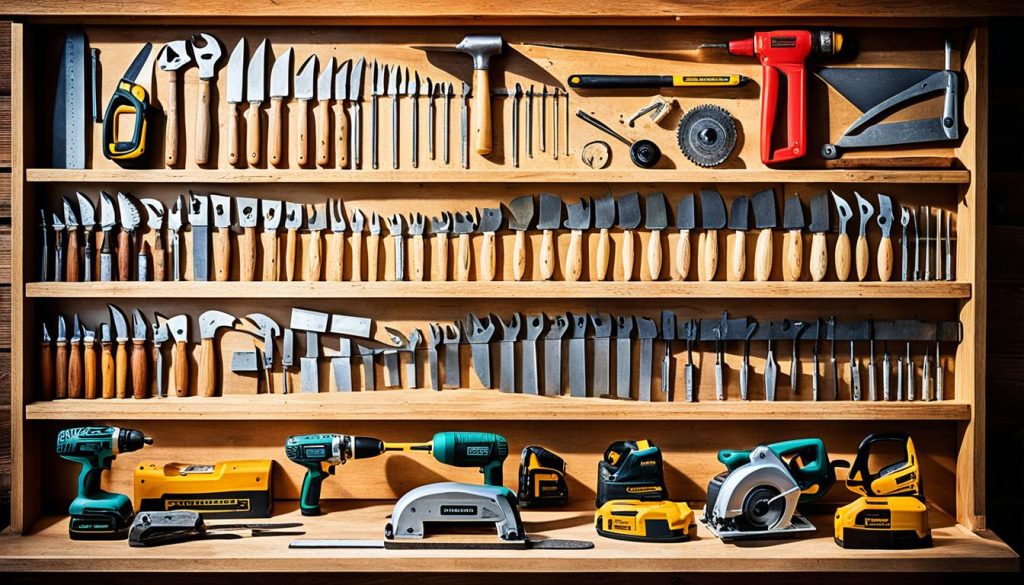
“The right tools can make all the difference in the success and enjoyment of your DIY projects.”
Hand Tools Every DIY Craftsman Should Possess
For any DIY craftsman, having the right tools is key. These tools are crucial for many projects, like making furniture or fixing things at home. A hammer, screwdrivers, and pliers are must-haves for any DIY lover.
The Necessity of a Quality Hammer
A good hammer is a must for DIY projects. It’s used for driving nails, removing screws, and making adjustments. Choose a hammer with a strong head and a handle that feels good in your hand. This tool helps you work efficiently on many tasks.
Understanding the Versatility of Screwdrivers
Screwdrivers come in different sizes and types for various jobs. Every DIY person should have a set with flat-head and Phillips-head screwdrivers. These tools are key for tightening, loosening, and putting things together, from furniture to electronics.
The Importance of a Good Set of Pliers
Pliers are a vital tool for DIY projects. A good set includes needle-nose, slip-joint, and cutting pliers. These tools are great for gripping, bending, and cutting. They’re essential for many tasks, from electrical work to fixing things at home.
With these essential tools, DIY lovers can start many projects with confidence. Having the right tools lets them bring their ideas to life.
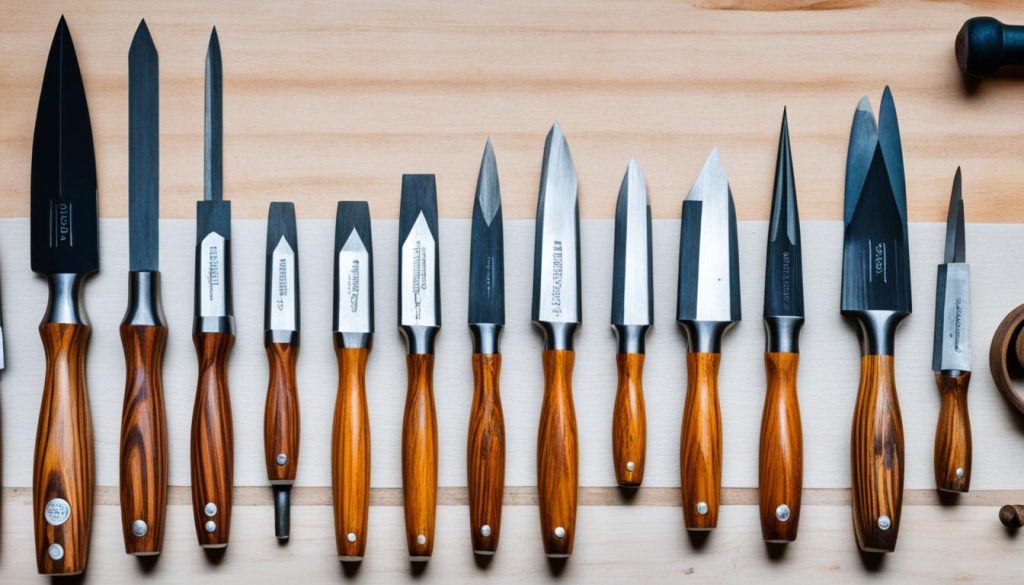
Must-Have Power Tools for DIY Craftsmen
Power tools change the game for DIY craftsmen, making tasks faster and more precise. They are key for a variety of tasks, like drilling, screwing, cutting, and sanding easily.
The Power of a Cordless Drill
A cordless drill is essential for DIY fans. It’s great for drilling and driving screws. Choose a mid-level kit with 65 to 95 pieces to be ready for many projects and materials.
Why Craftsmen Should Own a Circular Saw
The circular saw is vital for DIY projects. It cuts through wood and other materials with ease. Also, consider a sliding compound miter saw for precise cuts in furniture and craft projects.
The Benefits of a Power Sander
Getting a power sander saves time and effort in woodworking. There are different types for various tasks. Power sanders give a smooth finish, making manual sanding unnecessary.
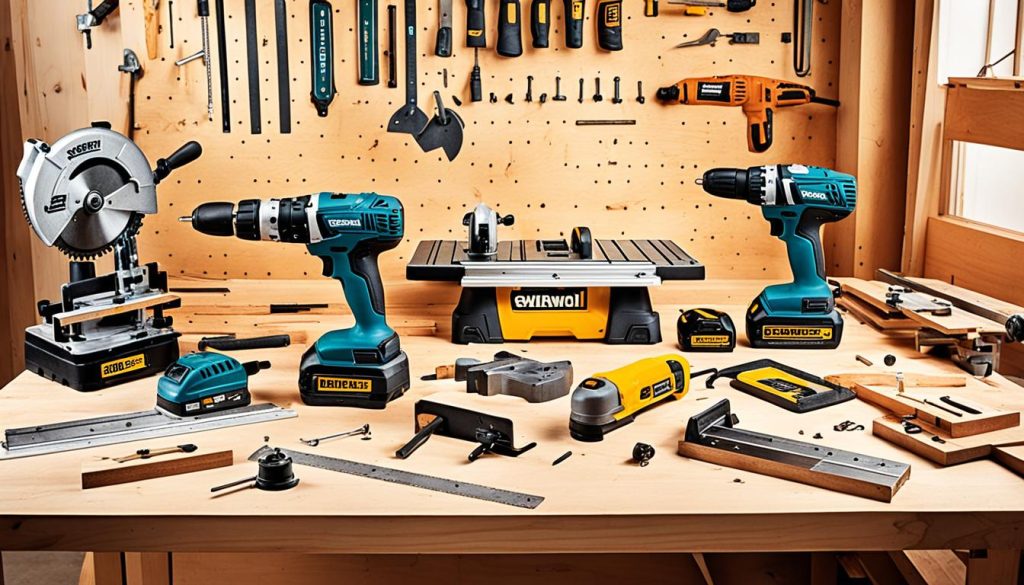
“A cordless drill/driver is highlighted as a must-have power tool for every DIYer, emphasizing its versatility in tasks such as screw driving, hole drilling, mixing, sanding, grinding, and more.”
Essential Woodworking Tools
Starting with DIY woodworking means having the right tools is key. You need tools for precision, efficiency, and safety. Hand and power tools are basics, but there are more tools every woodworker should have.
The table saw is a must-have for woodworking. It cuts wood accurately and safely, making it vital for any woodworking space. A router is also crucial for adding details like edges and profiles to your projects.
Chisels are vital for tasks like mortising and cleaning up joints. A good set of chisels, including a mortise chisel, ensures your work is precise. An orbital sander helps smooth surfaces and gets wood ready for finishing.
- Table saw
- Router
- Sharp chisels
- Orbital sander
- Bandsaw
- Dust collector
- Jointer
- Planer
- Miter saw
- Circular saw
Building a set of these woodworking tools, woodworking equipment, carpentry tools, and wood crafting supplies is important. It helps you make professional-looking projects. The goal is to get the right tools for your needs and skill level. This makes DIY woodworking rewarding and successful.
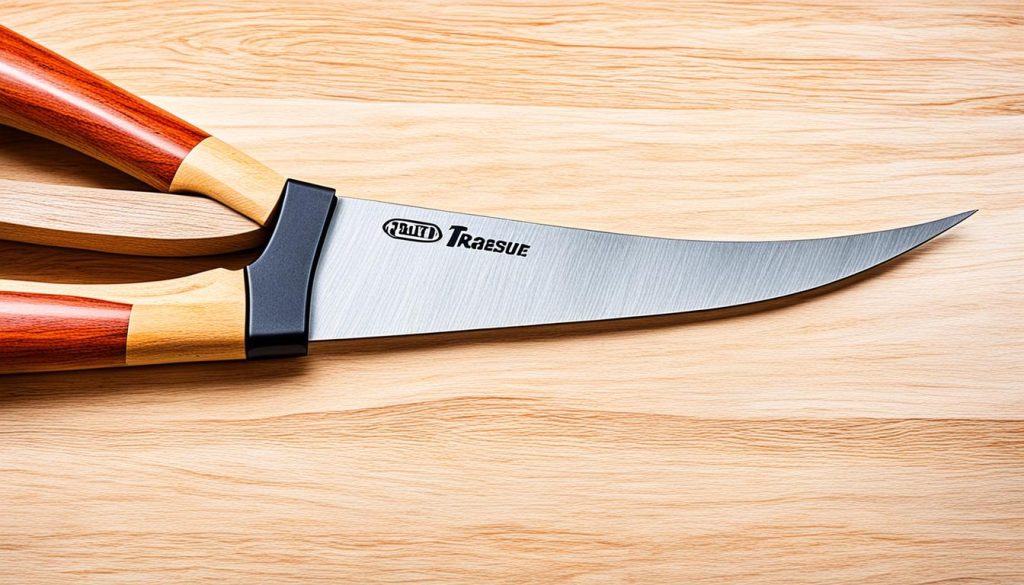
Safety Equipment Necessary for DIY Craftsmen
Safety is key for any DIY lover. Getting the right safety gear can stop accidents and make the woodshop safer. You should have protective eyewear, tough work gloves, and a first aid kit ready.
The Need for Safety Goggles
Power tools can be really loud, over 90 dB, which can hurt your hearing. You need safety goggles that block almost all dust and small particles. Always wear safety glasses when using power tools to protect your eyes.
Why Gloves are Essential for a Craftsman
Cut-resistant work gloves are key for protecting your hands from sharp things and moving parts. They’re not needed when you’re nailing, but they help a lot with power saws and other tools. Getting a good pair of gloves can really lower the risk of serious hand injuries.
The Importance of a First Aid Kit
Even with safety first, you might still get minor cuts or scrapes. Keep a first aid kit handy for these emergencies. Good woodworking also means having good dust collection and air flow to keep the work area safe and healthy.
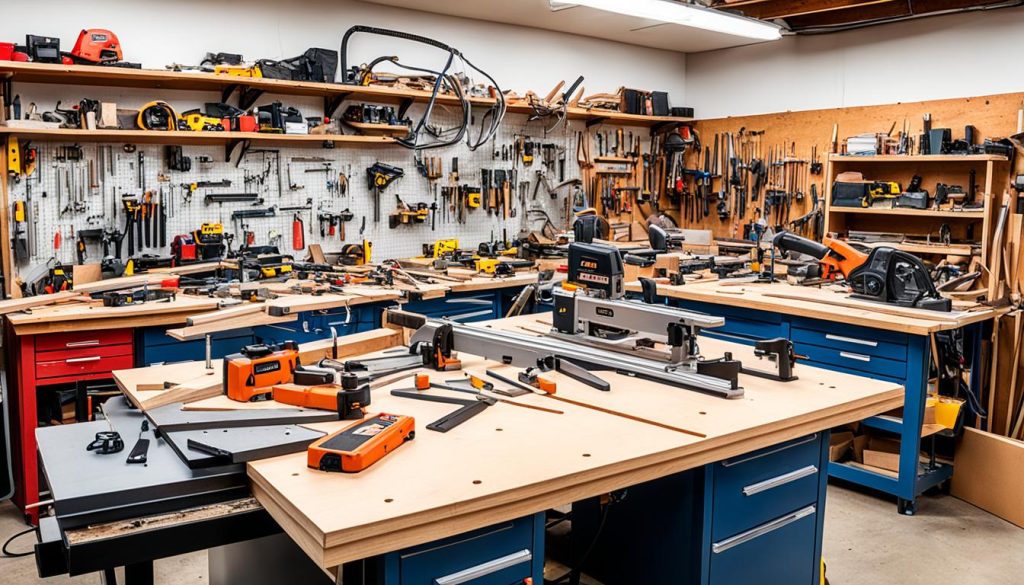
“Protecting your eyes, hands, and health is crucial for any DIY craftsman. Safety gear is a small cost that can prevent big accidents.”
Woodworking Measurement Tools
Getting your measurements right is key in woodworking. You’ll need a tape measure for size checks and a layout square for straight cuts. These precision tools make sure your projects fit together well and look professional.
The 12-inch combination square is a top pick for woodworking measurement tools. The 6-inch version is used most often. Sliding T-Bevels help with marking angles. Digital models save you from needing a protractor. Protractors help set angles right, which is super useful.
Mechanical pencils come in various sizes for different tasks. Use 0.7mm for general lines, 0.9mm for rough wood, and 0.5mm for smooth surfaces. Markers like Sharpies, especially the ultra-fine point, are great for precise marks on various materials.
| Woodworking Measurement Tool | Key Features | Recommended Brands | Price Range |
|---|---|---|---|
| Tape Measure | Reliable, accurate measurements | Stanley, Dewalt, Craftsman | $4.99 – $29.99 |
| Layout Square | Marking straight, square cuts | Swanson, Empire, Irwin | $9.99 – $59.99 |
| Combination Square | Versatile tool for various measurements | Starrett, Woodpeckers, iGaging | $19.99 – $189.00 |
| Sliding T-Bevel | Marking and transferring angles | Wixey, Starrett, Woodpeckers | $14.99 – $79.99 |
These woodworking measurement tools are vital for precise DIY projects. With the right tools, your projects will look professional and polished.
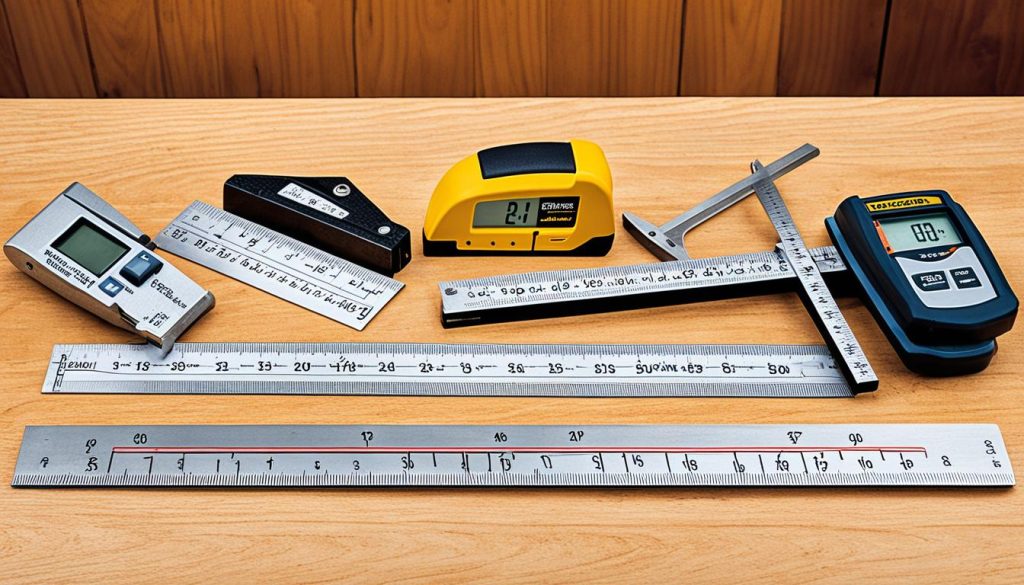
Cutting and Shaping Tools for Woodworking
For DIY lovers, having the right tools is key. The jigsaw and router are two must-haves. They bring versatility to your woodworking projects.
The Versatility of a Jigsaw
A jigsaw lets you make detailed cuts in wood, plastic, and even metal. Its fine-toothed blade is perfect for complex shapes and designs. It’s a go-to for precise cuts and detailed work.
The Importance of a Router
The router is a must-have for DIY woodworkers. It shapes, hollows, and adds decorative edges to your projects. It’s vital for furniture, cabinetry, or intricate wood designs. A router helps you achieve professional-quality results.
The jigsaw and router are woodworking cutting tools that boost a DIY craftsman’s skills. These power tools for woodworking are key for advanced projects. They make any woodworking workshop better.
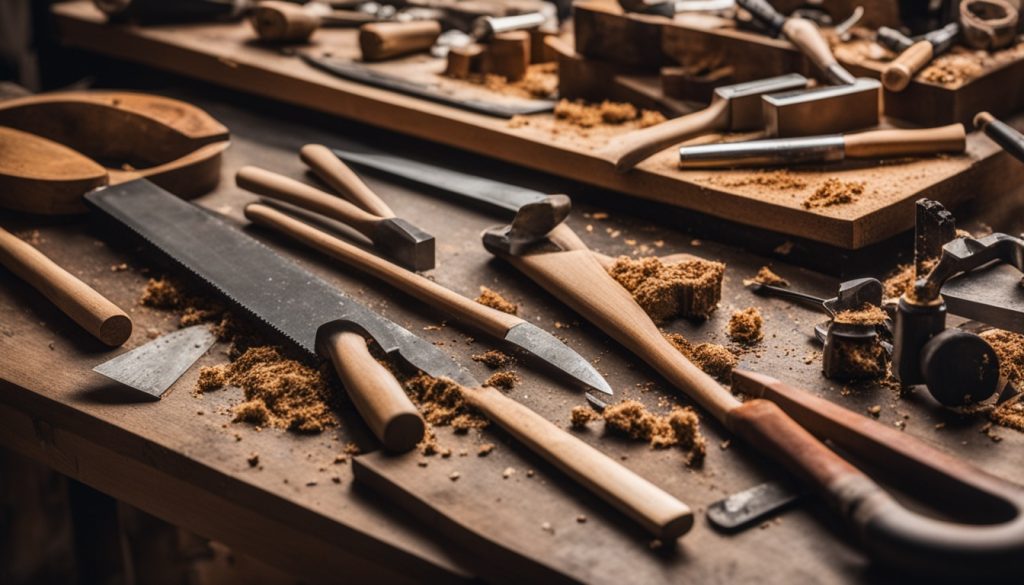
“The jigsaw and router are the dynamic duo of woodworking tools, unlocking endless possibilities for the DIY enthusiast.”
Woodworking Chisels and Utility Knives
Chisels and utility knives are key for DIY enthusiasts. They add precision and control to woodworking projects. These tools work well with power tools.
Woodworking chisels vary in size and shape for different tasks. Bench chisels are strong for cleaning joints and saw cuts. Paring chisels are fine for details. In Europe, gouges are more popular than knives for woodworking. Long bent chisels are great for carving concave shapes like spoons.
Utility knives are also crucial. They have retractable blades for tasks like opening packages and making cuts. BeaverCraft’s long bent gouges and chisels use tough carbon steel. This steel keeps its edge well and cuts through different woods.
Quality chisels and knives make DIY projects more efficient and comfortable. Ergonomic handles reduce hand fatigue during long carving sessions. Feedback from woodworkers helps improve tools, making sure they meet everyone’s needs.
| Woodworking Tool | Typical Price Range | Key Features |
|---|---|---|
| Bench Chisels | $13.00 – $226.00 | Versatile tools for cleaning out joints and saw cuts |
| Paring Chisels | $37.00 – $58.00 | Delicate tools for fine detailing and finishing touches |
| Utility Knives | Starts at $10.50 | Retractable blades for tasks like opening packages and making precise cuts |
For seasoned woodworkers or beginners, quality chisels and knives are a big help. They improve efficiency, precision, and safety in projects. By looking at your needs and doing research, you can find the right tools. These will enhance your woodworking skills.
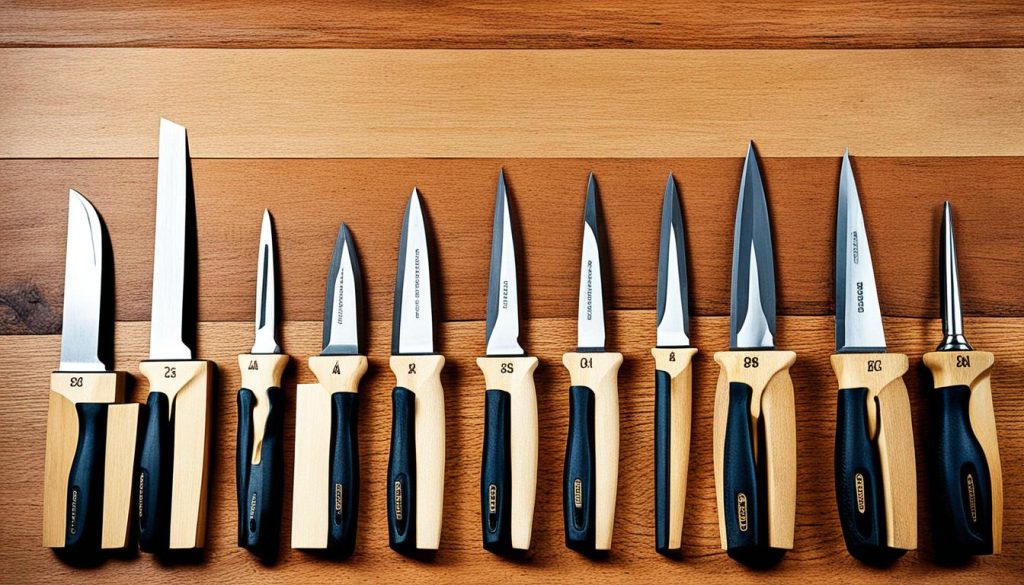
Organizing and Maintaining Your Woodworking Tools
Keeping your woodworking tools organized is key to a great workshop. It doesn’t matter if you’re just starting or have been doing it for years. Putting time into organizing and taking care of your tools can make you work faster and help your tools last longer.
Using tool chests, pegboards, or storage cabinets is a smart move for organizing tools. These options let you keep your tools in order and easy to find. Pegboards, for example, bring back memories of American garages and workshops from the mid-20th century.
It’s also important to take care of your tools. Cleaning, sharpening, and basic upkeep can make them last longer and work better. This makes you work more efficiently and safely in the workshop.
| Tool Organization Method | Advantages | Disadvantages |
|---|---|---|
| Plastic Drawers | Cost-effective, flexible | Smooth operation issues, tools can roll around |
| Portable Toolboxes | Portable, dust-free, flexible organization | Limited size, not ideal for fine woodworking tools |
| Pegboard Tool Walls | Nostalgic, customizable, accessible | Limited storage capacity, tools can get lost |
| Custom Foam Organizers | Tailored fit, easy tool identification | Requires specialized equipment, can be costly |
A well-organized and maintained workshop helps you be your best as a woodworking enthusiast. By choosing the right tool organization and maintenance strategies, you can make your workspace better, work more efficiently, and keep your woodworking tools in top shape.
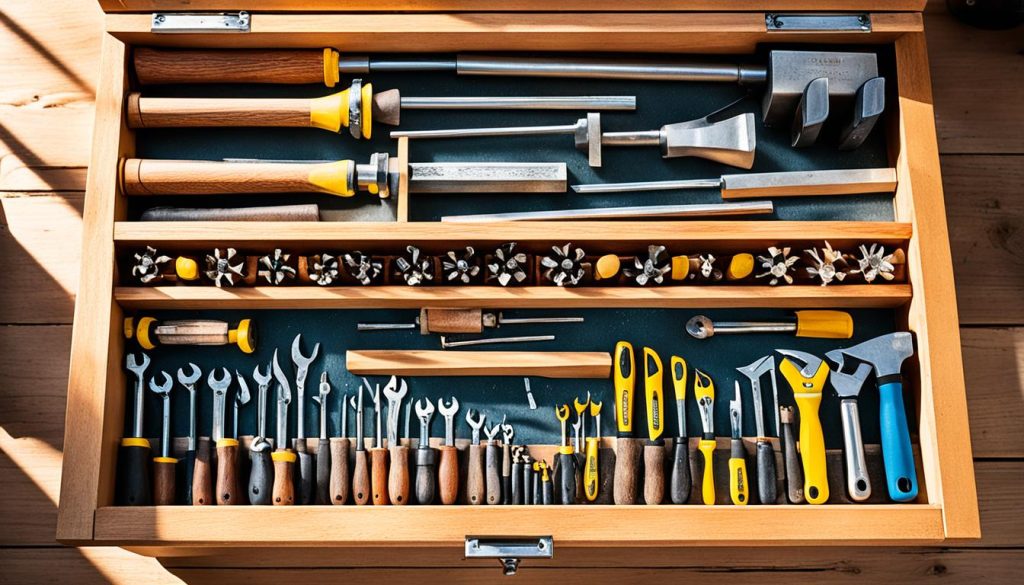
Woodworking Workshop Safety Guidelines
Keeping a safe workspace is key for DIY enthusiasts, especially with power tools and sharp items. It’s vital to follow safety rules to work well and safely.
Prioritize Personal Protective Equipment (PPE)
- Wear safety glasses with side shields or full-face masks to meet OSHA standards.
- Use ear protection such as earplugs or earmuffs for tasks that produce loud noise.
- Wear a respirator when working with materials that generate toxic fumes or dust particles.
- Avoid loose or baggy clothing and remove any dangling jewelry or metal items to prevent accidents.
Proper Tool Handling and Maintenance
- Unplug or turn off power tools before changing blades, bits, or performing maintenance.
- Keep blades and cutting tools sharp to ensure safe and efficient operation.
- Check reclaimed wood for nails, screws, or other metal objects before use.
- Always work against the cutter’s movement to reduce the risk of kickback.
Workspace Organization and Focus
- Use a single heavy-duty extension cord to power your tools and avoid trip hazards.
- Avoid reaching over a running blade, and wait for it to come to a complete stop before accessing the work area.
- Minimize distractions and maintain focus to prevent accidents.
- Ask for help when working with heavy or bulky materials, and avoid tasks beyond your physical limitations.
By following these woodworking workshop safety guidelines, DIY craftsmen can make a safe and productive space. This reduces the chance of accidents and injuries.
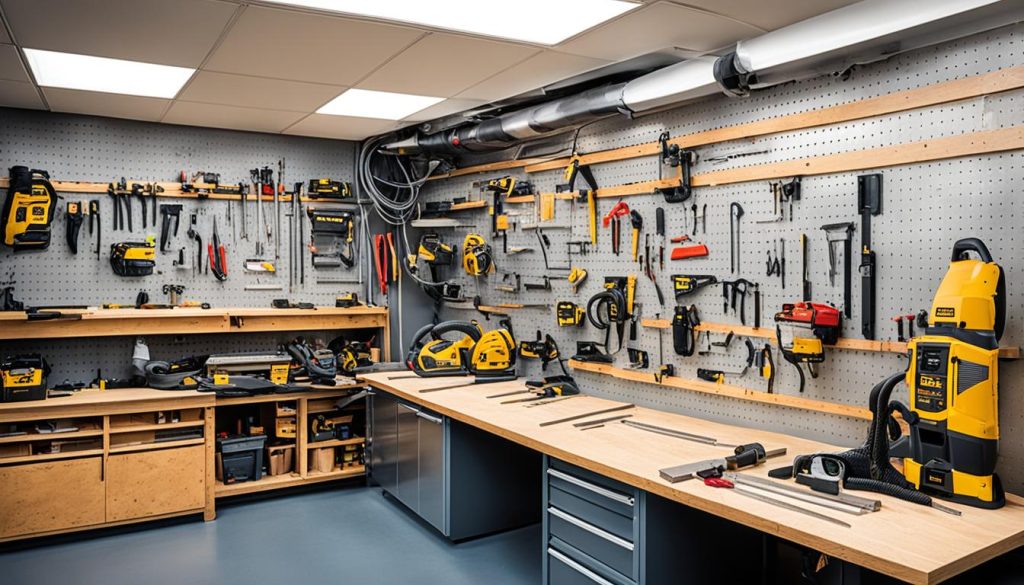
Conclusion
Having the right woodworking tools is key for DIY projects and craftsmanship. You’ll need both hand tools like hammers and screwdrivers, and power tools like cordless drills. The right tools make you more efficient, precise, safe, and improve your work’s quality.
Creating a full toolkit and keeping your tools organized and maintained is important. This way, you’re ready for any DIY or woodworking task. Whether you’re experienced or just starting, having the right tools helps you reach your creative goals and get professional results in your workshop.
The journey of woodworking is about the process and the final product. With the right essential tools and a safe, organized workshop, you’re on your way to making beautiful pieces. These pieces will impress and last a long time.